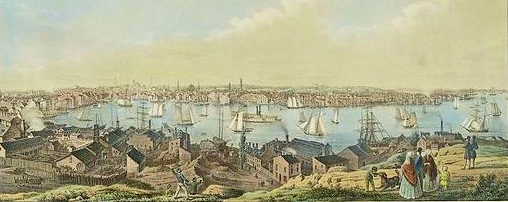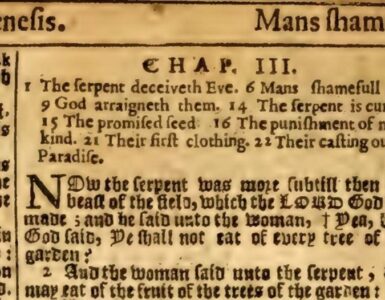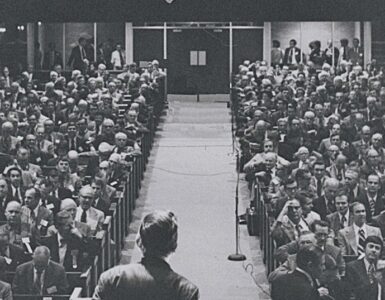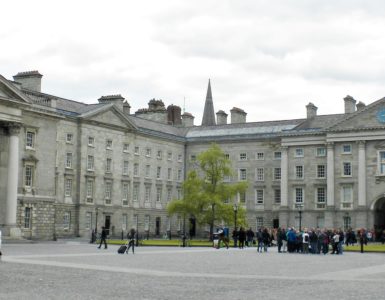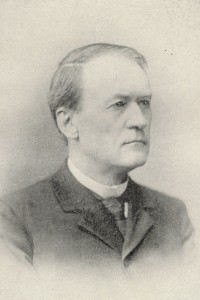 In Southern Presbyterian Worthies, John M. Wells describes the setting of scenic Strickler’s Springs—
In Southern Presbyterian Worthies, John M. Wells describes the setting of scenic Strickler’s Springs—
Near the center of Rockbridge County, Virginia, in the very heart of the Valley of Virginia, rises a massive peak known from its shape as House Mountain. Rugged, square, imposing, it may be seen from every part of the county.…Someone has said…that the peak has stamped its impress upon the people of that country. They are larger in size, more massive in their thinking, stronger in character, because for generations they have been looking upon the great mountain (180).
It was within this setting that Givens Brown Strickler was born April 25, 1840 to Joseph and Mary Jane (Brown) Strickler. The boy was trained doctrinally with the Bible and the Westminster Shorter Catechism. His early education was accomplished with tutors and in local schools. Briefly, he left home and worked as a printer with a newspaper in Lynchburg before entering Washington College (currently Washington and Lee University) in Lexington in 1858. At the time the college president was Rev. George Junkin. Another educational institution in Lexington not far from Washington College is the Virginia Military Institute, which would soon find its students and faculty in active service. Professor Thomas J. Jackson would cease delivering his monotone lectures on artillery, acoustics, mechanics, astronomy, and physics to join the Confederate Army and practice what he really knew, as young Strickler would soon find out, the art of war.
In April 1861, the Civil War began and G. B. Strickler joined other students in the nation putting aside their studies to enter the conflict. He was initially a corporal in the Liberty Hall Volunteers. As the war continued, Strickler fought under the command of Jackson in the Stonewall Brigade, was promoted to sergeant, then lieutenant, and finally captain. After Jackson’s friendly-fire death at Chancellorsville, Strickler led his company at Gettysburg but was captured, imprisoned at Ft. McHenry, then transferred to Johnson’s Island. While in prison he taught the basics to fellow prisoners some of whom had little if any education, read to them, was president of the oratory club, and conducted religious services. When Strickler suggested to one of his friends he was corresponding with in another prison that they write in Greek, the friend survived the embarrassment of not knowing Greek by telling Strickler that the officer in charge of the prison would not allow such uncommon writing and would likely think is was a secret code (not a bad idea).
When the war ended, Givens returned to Washington College during the presidency of Robert E. Lee and graduated with distinction in 1867. He continued at the college for the next session as an instructor of Latin before entering Union Seminary in 1868. While completing his seminary studies his proficiency in Greek provided the opportunity to assist the faculty teaching the language. Strickler was licensed to preach September 2, 1870. After testing his gifts as a licentiate he was ordained and installed by Lexington Presbytery of the Presbyterian Church in the United States (PCUS), May 19, 1871 in the Tinkling Spring Church in Augusta County. During his pastorate he married Mary Frances Moore who was a member of the Falling Springs Church near Natural Bridge. He continued ministry for nearly thirteen years at rural Tinkling Spring Church before transitioning to a major city church for his next call.
Strickler moved south from Virginia to Central Presbyterian Church in Atlanta Georgia in 1883. When he left Tinkling Spring, the church had almost three hundred communicant members but his new call to Central provided the opportunity to minister to a congregation of over four hundred. At the time of his installation the congregation was torn by dissension, but through his efforts at reconciliation, peace was achieved. During the thirteen years of ministry in Atlanta, the congregation grew to just over nine hundred communicants and it had started new congregations in the city with seed groups from Central’s membership.
During the Atlanta years Strickler was involved in connectional ministry at the presbytery, synod, and general assembly levels. When the PCUS General Assembly convened Thursday, May 19, 1887, in Grand Avenue Presbyterian Church, St. Louis, retiring moderator Rev. J. H. Bryson delivered the sermon from John 12:32, “I, if I be lifted up, will draw all men unto me.” G. B. Strickler was elected moderator and would lead sessions extending to Friday, May 27th. Several overtures were received “touching the relation which ought to be sustained by our Church and the Presbyterian Church in the United States of America” (188). Moderator Strickler appointed a committee consisting of thirteen teaching and thirteen ruling elders to report on reunion. There was communication from the PCUSA (predominantly churches in the North) to reunite with the PCUS (predominantly in the South) in light of their agreement to have special meetings in Philadelphia in 1888 to commemorate the centennial of the First General Assembly. Telegrams were exchanged during sessions between the two denominations as they sought to work reunion out. The Second Church, Philadelphia, offered use of its property to the PCUS to hold its assembly in 1888, but the offer was graciously turned down. This attempt to reunite was not achieved despite the hopes of many in both denominations, but the centennial celebration in 1888 would go well with the proceedings and discourses published, including one by Strickler, who stood in for B. M. Palmer, titled, “The Children of the Covenant” (see Notes).
Another issue that led to extended debate was concerning the office of elder and the differences between the ruling and teaching aspects of the single office of elder. This two-office view vs. the three-office view would become a hallmark of the PCUS. A question of concern raised by overtures was whether the ruling elder could be moderator of a session. There were five BCO changes proposed to address the question as seen in the following readings: “These ruling elders do not labor in word and doctrine, but possess the same authority, and eligibility to office in the courts of the Church as the ministers of the word”; “The pastor is, for prudential reasons, Moderator of the Session”; “And the Moderator, or, in the case of his absence, the last Moderator present, or the oldest minister in attendance, shall (except as hereinafter provided) open the meeting with a sermon, [etc.]”; “Provided, however, that when the Moderator of one of the higher courts is a ruling elder, the preaching of the opening sermon, or any other official duty the performance of which requires the exercise of functions pertaining only to the teaching elder, shall be remitted by him for execution to such minister of the word, being a member of the court, as he may select”; and finally, “he shall pray and return thanks and pronounce, or cause to be pronounced, on those present the apostolic benediction.” These changes were sent down to the presbyteries for approval (231). Those familiar with the PCA Book of Church Order will notice practices in these amendments in the current PCA Book. When the Assembly ended, Moderator Strickler had overseen some controversial and time consuming debate, particularly in relation to reuniting the Presbyterians, but this issue would not be resolved for nearly a century. When the Assembly convened in Baltimore in 1888, Strickler delivered his retiring moderator’s sermon from John 15:5. “I am the vine, ye are the branches.”
In 1896, Dr. Strickler was called to the Chair of Systematic Theology in Union Theological Seminary succeeding the professorship of C. R. Vaughan. His call to Union was his last ministerial move and though he was not an industrious writer, the students and faculty greatly respected his teaching and persuasive method. He was not a professor of great new insights but instead relied heavily on the works of the instructor from whom he learned theology, Robert L. Dabney.
In 1913, Dr. Strickler and A. M. Fraser were elected by Lexington Presbytery to attend the General Assembly in Atlanta. Following the meeting, Strickler stopped in Laurens, South Carolina, to visit one of his daughters and during the visit became ill. His condition improved but due to continued weakness he returned to Atlanta and stayed with his son, Dr. Cyrus W. Strickler. After several weeks he died August 4, 1913. A funeral service was held for him by Central Presbyterian Church, then his body was transported to Richmond for other services held to remember him. He was buried in Hollywood Cemetery next to Mary Jane who preceded him in 1905. The Stricklers had seven children, two of whom died in infancy.
G. B. Strickler was honored with the Doctor of Divinity by Washington and Lee University, 1878 , then Davidson College gave him the Doctor of Laws, LL D, in 1894. He was also a member of the Board of Trustees of Washington and Lee University from 1894 until his death. He edited The Presbyterian Quarterly, for its entire run from 1887 to 1904.
Dr. Strickler’s books include, Sermons, published by both by Fleming H. Revell and the Presbyterian Committee of Publications in 1910; the book includes sermons delivered almost entirely at Tinkling Spring. His lecture titled, “The Nature, Value, and Special Utility of the Catechisms,” was published in Memorial Volume of the Westminster Assembly, 1647-1897, Richmond: The Presbyterian Committee of Publication, 1897, on pages 117-38; and “The Philosophy of Faith,” was published in The Presbyterian Quarterly 16:2 (October 1902): 149-165. His works are available for PDF download on the Log College Press website at “Givens Brown Strickler, 1840-1913.”
Barry Waugh
Sources—The header is from the New York Public Library Digital Collection, “View of Baltimore,” 1848. This biography was first posted November 6, 2014, but the summary of the 1887 General Assembly was added December 6, 2024; the minutes used for the summary are, Minutes of the General Assembly of the Presbyterian Church in the United States, With an Appendix, Vol. VII. A. D. 1887, Columbia: Printed at the Presbyterian Publishing House, 1887. For further study of the development of the PCA BCO see Director Wayne Sparkman’s extensive work on the Historical Center website, “The Historical Development of the PCA Book of Church Order.” The Assembly centennial proceedings were published in W. H. Roberts, Addresses Delivered at the Celebration of the Centennial of the General Assembly of the Presbyterian Church in the Academy of Music and Horticultural Hall, Philadelphia, on May 24th, 1888. The header is cropped from “Johnson’s Virginia, Delaware, Maryland & West Virginia,” 1864, as from the Lioner Pincus and Princess Firval Map Division of the New York Public Library Digital Collection. John M. Wells, Southern Presbyterian Worthies, Richmond: Presbyterian Committee of Publication, 1936, Strickler’s section is in pages 180-207, the other biographies in the book are J. H. Thornwell, J. L. Wilson, Daniel Baker, M. D. Hoge, B. M. Palmer, and W. W. Moore. A Copious Fountain: A History of Union Presbyterian Seminary, 1812-2012, 2016, by William B. Sweetser, Jr. Howard McKnight Wilson, The Tinkling Spring: Headwater of Freedom, A Study of the Church and Her People, 1732-1952, Fisherville: The Tinkling Spring Presbyterian Church, 1954, pages 327-30.


